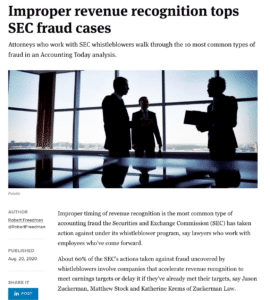
Report Accounting Fraud and Earn an SEC Whistleblower Award

If you become aware of accounting or securities fraud, it is critical to evaluate your options for reporting the fraud, including the option to report anonymously to the SEC through an attorney, and know what laws protect you from any potential retaliation. The SEC Whistleblower Program and the Sarbanes-Oxley Act both protect accounting fraud whistleblowers from retaliation.






In conjunction with our courageous clients, our SEC whistleblower lawyers have helped the SEC halt multi-million dollar investment schemes, expose violations at large publicly traded companies, and return funds to defrauded investors.
In contrast to many other SEC whistleblower law firms, our team of SEC whistleblower lawyers includes a Certified Public Accountant and Certified Fraud Examiner with substantial experience auditing public companies and investigating complex fraud schemes. We understand the many challenges that the SEC faces in investigating our clients’ disclosures and take measures to increase the likelihood that the SEC will be able to effectively pursue the disclosures that our SEC whistleblower lawyers provide on behalf of our clients.
Top 10 Accounting Schemes
The following are the top 10 accounting schemes that companies use to cook the books, with brief explanations of each scheme and examples of SEC enforcement actions punishing that type of accounting fraud.
1. Improper Timing of Revenue Recognition
The most common way that companies cook the books is through improper revenue recognition schemes. According to a study by the Committee of Sponsoring Organizations of the Treadway Commission (COSO), more than 60% of SEC enforcement actions against companies for financial statement fraud relate to improper revenue recognition. The most frequently used revenue recognition scheme involves the improper timing of revenue recognition.
Revenue should only be recognized once it has been both earned and realized. Improper timing of revenue recognition occurs when a company inappropriately shifts revenue from one period to another. Most commonly, companies inappropriately accelerate revenue recognition in order to meet their earnings targets. Conversely, companies may also inappropriately delay recognizing revenue if they have already met their revenue guidance for the period. This accounting scheme can be difficult to detect, especially when companies have multiple element or bundled contracts.
Improper Timing of Revenue Recognition SEC Enforcement Actions:
- In the Matter of Marvell Technology Group, Ltd., Marvell orchestrated a scheme to accelerate, or “pull-in,” sales from future quarters to the current quarter in order to “close the gap between actual and forecasted revenue and to meet publicly-issued revenue guidance.” The pull-ins for these quarters amounted to 5% and 16% of the company’s total quarterly revenues. Notably, the SEC also has an ongoing investigation against Under Armour for improperly pulling forward sales.
- In SEC v. Tangoe, telecommunications expense management company Tangoe paid $1.5 million to settle charges that it reported revenue prematurely for work that had not been performed and for transactions that did not produce any revenue at all. The SEC alleged the company counted customers’ prepayments for future services as current revenue, prematurely recorded revenue from contingent fee arrangements, and prematurely counted revenue from long-term contracts with continuing obligations.
- In the Matter of L3 Technologies, Inc., the SEC charged aerospace and defense company L3 with failing to maintain accurate books and records and failing to maintain adequate internal controls. The company had improperly recorded $17.9 million in revenue from a contract by creating invoices associated with unresolved claims that had not yet been delivered when the revenue was recorded.
2. Fictitious Revenue
Another common revenue recognition scheme is recognizing fictitious revenue. For example, a company may falsely inflate its earnings by recognizing revenue related to fake contacts or other nonexistent sales. This scheme, perhaps surprisingly, continues to be uncovered at even the largest publicly traded companies in the world. Most recently, an internal investigation at Luckin Coffee, a company with a $3 billion market capitalization at the time, revealed that Luckin Coffee had recognized $300 million in fictitious revenue in 2019. News of the fraud caused the company’s stock price to plummet overnight.
Fictitious Revenue SEC Enforcement Actions:
- In SEC Longfin Corp. and Venkata S. Meenavalli, the SEC alleged that Longfin and Meenavalli reported over $66 million in sham revenue, comprising over 90% of Longfin’s total reported revenue for the year.
- In SEC v. Putnam, the Commission charged Anicom Inc. and its directors with violating federal securities laws after the company falsely reported millions of dollars of nonexistent sales to inflate net income by more than $20 million. The SEC alleged Anicom included in its financial statements millions of dollars in sales to a fictitious customer, SCL Integration.
- In the Matter of FCA US LLC, et al., the SEC alleged Michigan-based automaker FCA paid dealers to report fake sales and maintained a “cookie jar” database of unreported, actual sales. The company claimed to have a four-year, uninterrupted streak of sales growth, where in reality the streak ended after fewer than two years. In months when the growth streak would have ended, FCA used the “cookie jar” to report previous sales as though they were new. This accounting scandal resulted in FCA agreeing to pay $40 million to settle the charges.
3. Channel Stuffing
Channel stuffing is an improper revenue recognition practice in which a company fraudulently inflates its sales by sending excessive amounts of products to its distributors ahead of demand. This practice typically occurs near the end of reporting periods when a company needs to increase its revenues to meet financial projections and market expectations. A company will oversell inventory to distributors in amounts that far exceed the public’s demand for the products and prematurely recognize revenue on future sales.
Channel Stuffing SEC Enforcement Actions:
- In SEC v. Symbol Technologies Inc., the SEC obtained a $131 million judgment against manufacturer Symbol Technologies Inc. for fraudulent revenue-recognition practices, including quarter-end “stuffing” of Symbol’s distribution channel to help meet revenue and earnings targets imposed by its CEO.
- In SEC v. Bristol-Myers Squibb, biopharmaceutical company Bristol-Myers Squibb agreed to pay a $150 million fine for selling excessive amounts of pharmaceutical products to its wholesalers ahead of demand in order to falsely inflate earnings. This resulted in the company improperly recognizing revenue from $1.5 billion in sales to its two largest wholesalers. In addition, the SEC filed charges against two former Bristol-Myers officers for the fraudulent earnings management scheme.
4. Third-Party Transactions
Companies may also inappropriately recognize revenue through improper or fraudulent third-party transactions. The transactions that are most susceptible to fraud include bill and hold sales, consignment sales, side letter agreements, and other contingency sales.
Third-Party Transactions SEC Enforcement Action:
In the Matter of Alere Inc., the SEC alleged that the company improperly recognized revenue from “contingent arrangements, bill and hold transactions, and sales where the product was stored at a third-party’s warehouse.” In total, these sales arrangements led the company to improperly recognize approximately $24 million earlier than permissible under GAAP.
5. Fraudulent Management Estimates
A company’s management may improperly adjust and inaccurately report accounting estimates to favorably impact financial statements. For example, management may use inappropriate methodologies to determine and report write-offs or other key metrics, resulting in inaccurate accounting and misstatement of income.
Fraudulent Management Estimates SEC Enforcement Action:
In the Matter of Computer Sciences Corporation et al., Computer Sciences Corporation agreed to pay $190 million to settle charges that the company engaged in wide-ranging accounting and disclosure fraud. The SEC alleged that the company materially overstated its earnings and concealed from investors significant problems with its largest contract. According to the SEC’s order, the company’s former Finance Director prepared a fraudulent accounting model in which he included false assumptions to avoid reporting a negative hit to the company’s earnings.
6. Improper Capitalization of Expenses
Companies should classify the costs of expenditures as assets or expenses in their financial statements. Improper capitalization of expenses occurs when a company capitalizes current costs that do not benefit future periods. By doing so, a company will understate its expenses in the period and overstate net income. The most well-known example of this scheme involved WorldCom, in which the company overstated its net income by more than $9 billion by, among other accounting tricks, improperly capitalizing operating expenses.
Improper Capitalization of Expenses SEC Enforcement Action:
In SEC v. Penn West Petroleum Ltd. et al., Penn West, a Canadian-based oil and gas company agreed to pay $8.5 million in civil penalties for fraudulently moving hundreds of millions of dollars in expenses from operating expense accounts to capital expenditure accounts. This accounting fraud artificially reduced the company’s operating costs by as much as 20 percent in certain periods. The object of the scheme was to deceive investors about a key publicly reported metric concerning the cost of oil extraction and processing needed to sell a barrel of oil.
7. Other Improper Expense Recognition Schemes
In addition to improperly capitalizing expenses, a company may use other expense recognition schemes to inappropriately overstate net income. For example, a company may falsely inflate its net income in a period by improperly: (1) eliminating or deferring current period expenses; (2) allocating more costs to inventory than cost of goods sold; (3) creating excess reserves by initially over-accruing a liability in one period (also known as “cookie-jar” reserves) and then reducing the excess reserves in later periods; (4) understating reserves for bad debt and loan losses; and (5) failing to record asset impairments.
Improper Expense Recognition SEC Enforcement Action:
In SEC v. Celadon Group, Inc., truckload shipping company Celadon engaged in fraudulent third-party transactions to overstate income and earnings and avoid recognizing at least $20 million in impairment losses and charges. This accounting scandal resulted in the company significantly overstating its pre-tax and net income and earnings.
8. Misleading Forecasts or Projections
A company may issue misleading forecasts to avoid disclosing a known, increased risk of missing key financial goals or metrics that investors rely on to evaluate financial statements. Even when a company becomes aware of an increased risk of missing the projections, public statements may reaffirm the original projections, in violation of securities laws. The Securities Act of 1933 prohibits untrue statements or omissions in the offer or sale of securities.
Misleading Forecasts or Projections SEC Enforcement Action:
In the Matter of Walgreens Boots Alliance Inc. et al., the SEC charged the company with misleading investors during Walgreens’ two-step merger with Alliance Boots. The SEC alleged that after the first step of the merger, the company internally forecasted an increased risk of missing its yearly earnings projection but publicly reaffirmed its original projection. Walgreens Boots Alliance paid $34.5 million to settle the claims related to this accounting scandal.
9. Misleading Non-GAAP Reporting
While companies may use non-GAAP reporting metrics where GAAP figures do not fully portray their financial condition, they must report non-GAAP metrics accurately. A company may manipulate non-GAAP measures to reflect stronger growth or higher earnings. Since 2013, there has been a dramatic increase in publicly traded companies reporting non-GAAP numbers in their financial statements.
Misleading Non-GAAP Reporting SEC Enforcement Action:
In the Matter of Brixmor Property Group Inc., the SEC charged real estate investment company Brixmor and four former senior executives with manipulating a non-GAAP metric that analysts and investors relied on to evaluate the company’s financial performance. The SEC alleged that to meet public growth targets, the ex-executives adjusted the company’s same property net operating income, a key metric, in violation of the antifraud and books and records provisions of the Exchange Act and Rule 100(b) of Regulation G, which relates to reporting non-GAAP performance measures. The company agreed to pay $7 million to settle the charges, and in a parallel action, the U.S. Attorney’s Office for the Southern District of New York filed criminal charges against the ex-executives.
10. Inadequate Internal Controls Over Financial Reporting (ICFR)
The Exchange Act requires all companies reporting to the SEC to devise and maintain a system of internal controls over financial reporting (ICFR). This system of controls must provide reasonable assurance that transactions are properly recorded and financial statements are prepared in accordance with GAAP. A wide range of accounting scandals violate this requirement.
Inadequate ICFR SEC Enforcement Action:
In SEC v. Monsanto, the SEC announced that Monsanto agreed to pay an $80 million penalty for inadequate internal accounting controls. According to the SEC’s order, the company failed to properly account for millions of dollars in rebates offered to retailers and distributors of Roundup after generic competition had undercut its prices and caused the company to lose significant share in the market. Monsanto booked substantial amounts of revenue from sales incentivized by the rebate program but failed to recognize all of the related program costs at the same time. A whistleblower received a more than $22 million award for disclosing this fraud to the SEC.
Conclusion
Whistleblower tips have played a critical role in the SEC’s renewed efforts to combat accounting fraud. The SEC whistleblower program allows whistleblowers to report accounting fraud anonymously to the SEC if represented by an attorney and offers awards to whistleblowers if their tip leads to a successful enforcement action with total monetary sanctions in excess of $1 million.
Since 2011, the SEC has issued more than $2 billion in SEC whistleblower awards. The largest SEC whistleblower awards to date are:
- $279 million – May 5, 2023
- $114 million – Oct. 22, 2020
- $110 million – Sept. 15, 2021
- $82 million – Aug. 23, 2024
- $50 million – April 15, 2021
- $50 million – March 19, 2018
- $50 million – June 4, 2020
- $39 million – Sept. 6, 2018
- $37 million – Dec. 19, 2022
- $37 million – July 26, 2024
Critically, nearly all individuals, regardless of their position in a company are, or can become, eligible for an award under the program if certain steps are taken. This includes directors, gatekeepers and, in some instances, even culpable whistleblowers. If a whistleblower becomes aware of accounting or securities fraud, they should consult with an experienced SEC whistleblower attorney to determine whether they need to take any actions to be eligible for an award. Moreover, whistleblowers should understand the substantial protections against retaliation offered by the SEC Whistleblower Program and the Sarbanes-Oxley Act.
For more information about the SEC whistleblower program, see our article:
- 5 Tips for SEC Whistleblowers and Lessons Learned from SEC Whistleblower Awards
- How the Best SEC Whistleblower Law Firms Advocate for SEC Whistleblowers




